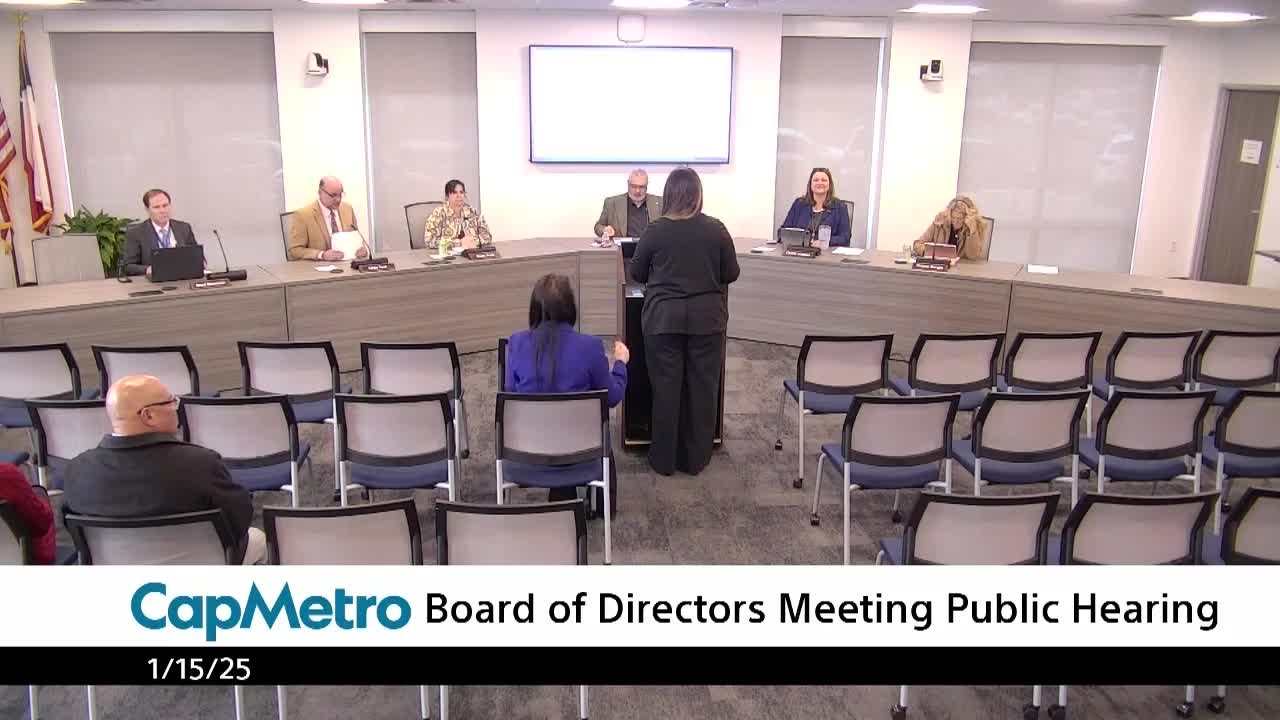CapMetro demonstrates new fare validators, rollouts tap-to-pay and app migration; Title VI review preliminarily finds no disparate impacts
Get AI-powered insights, summaries, and transcripts
Subscribe
Summary
Capital Metropolitan Transportation Authority staff demonstrated new on-vehicle validators, handheld fare devices for rail conductors and an app migration at a public hearing on Wednesday, Jan. 15, in Austin’s Rosa Parks boardroom, and outlined a phased switch that will retire AMP cards and some multi-day passes while adding tap-to-pay and daily fare capping.
Capital Metropolitan Transportation Authority staff demonstrated new on-vehicle validators, handheld fare devices for rail conductors and an app migration at a public hearing on Wednesday, Jan. 15, in Austin’s Rosa Parks boardroom, and outlined a phased switch that will retire AMP cards and some multi-day passes while adding tap-to-pay and daily fare capping.
The changes affect how customers pay, not the fare amounts. "Anytime anytime we talk about fares, the first thing we need to clarify is that our fares are not changing," Samantha Baez, CapMetro’s executive vice president of experience and engagement, said during the presentation. The board received a preliminary Title VI analysis that staff said found no disparate impact or disproportionate burden on minority or low-income riders; a finalized report was scheduled to be delivered to the board at its Jan. 27 meeting.
CapMetro showed the new validators and a smaller handheld validator staff called a rugged, work-phone style device that conductors will use to validate fares on trains. Staff said the new validators, which began installing in mid-December, have faster scanning, visual and audio acceptance/denial indicators, and support tap-to-pay through credit/debit cards and digital wallets. "This year, we're getting Tap to Pay," Baez said. Brandy Mueller, director of revenue and fares, added: "With the Tap 2 Pay comes fare capping."
Staff said the agency will retire the AMP reloadable fare card and issue a new reloadable fare card with clearer branding; AMP cards will stop working with the new validators. CapMetro will also discontinue its current CapMetro-branded app at the start of March and move trip planning to the Transit app and fare payment to the UMO app, with staff working to integrate the two so customers do not need both. Mueller said there may be a transition period when users need both apps, but the goal is to minimize it.
Mueller and Baez said paper cash fares and ticket vending machine functionality will remain: customers can still buy or reload fare cards with cash at vending machines and retail outlets. Staff said they currently count roughly a 50/50 split between cash and digital payment usage among riders and estimated about 1,300 remaining AMP-card users; they plan to begin exchanging cards and transferring balances the month after the hearing. Key dates staff provided include: begin card-exchange efforts in February, have old validators stop working on March 1, and require plastic passes to be switched out by April 1.
CapMetro staff outlined how specific customer groups will be affected. HMIS customers will receive a new one-year fare card before launch; reduced-fare ID and MetroAccess processes will continue but require customers using digital wallets to move to the UMO app; Access riders who use the Paratransit (Spare) app will continue to use that app; and Via pickup riders may pay through the new UMO app. Rail riders will gain tap-to-pay and handheld validation options for conductors.
Staff described the Title VI review staff commissioned for retiring the 7- and 31-day passes, saying the preliminary report indicated changes were "under the threshold" for disparate impact between minority and non-minority riders and between low-income and non-low-income riders; staff said the final Title VI report would be provided to the board on Jan. 27. Mueller said the change to retire the 7- and 31-day digital passes was intended to simplify 98 existing pass types across paper, plastic and digital media and to enable fare capping for digital wallet or reloadable-card users.
During public comment, remote speaker Zenobia Joseph challenged staff to include a cost-benefit analysis showing how much it would cost if the whole system were free and criticized the $6,400,000 figure she said is being paid for a new Cubic Transportation contract. Joseph urged the agency to make the system free and said she believed the current system was inequitable; she also referenced a Jan. 10 Austin Monitor article reporting the agency’s budget relies primarily on a 1% sales tax. Joseph framed her concerns as equity and transparency issues and asked staff to include the requested analysis in future board materials. "I would ask you to make the system free," Joseph said.
No votes or formal board decisions occurred during the hearing; the presentation concluded and the board opened and then closed public comment. Staff said they will distribute the final Title VI report and other backup materials with the Jan. 27 board packet.
The presentation and follow-up questions from Board member Bea clarified that tap-to-pay using credit or debit cards and digital wallets will receive daily fare capping when tapped, but staff said they intentionally limited fare capping on credit cards to daily caps rather than monthly caps for privacy and security reasons. Board member Bea confirmed that a customer without an app who has a tap-to-pay credit card will be able to board and be fare-capped on a daily basis if they tap multiple times.
CapMetro staff stressed that these are system and payment-method changes, not fare increases, and emphasized an implementation process that will include outreach, card exchange and continued retail and vending support.
Ending note: staff reiterated the timeline for migration and the plan to present the final Title VI report at the Jan. 27 board meeting; the public hearing was adjourned at 12:32 p.m.
